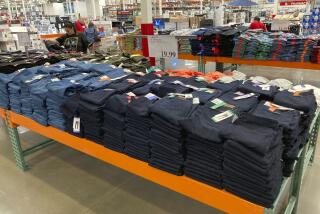Inflated Yen Not Such a Big Deal in Japan : Currency: Most Japanese say their savings on foreign goods haven’t kept pace with the rise.
- Share via
TOKYO — In theory, the soaring Japanese yen should be a boon to buyers of foreign goods. In real life, though, it hasn’t made too much of a difference.
Since the start of the year, the yen has gained nearly 20% in value against the dollar and other dollar-pegged currencies. But most ordinary Japanese say their savings on foreign products haven’t kept pace with their currency’s climb.
“The high yen is hardly reflected at all in our pocketbooks,” said Norio Hamaguchi as he waited to get his tank filled at a neighborhood gas station.
The price of gasoline is one example. Japanese motorists pay around $4.62 per gallon for gasoline--about 6% less than at the start of the year, but hardly reflective of the strong yen.
Other products also remain expensive in Japan. Wrangler 700 jeans go for $117 a pair. At the Seibu department store, a simple short-sleeved shirt by Ralph Lauren will also set you back $117. Italian shoes start at $215 per pair.
“Imported clothing costs just as much as before,” said Yukimi Masui, a college lecturer who, like many Japanese, shops for clothes when traveling abroad.
For the Japanese, the continued high prices of many imports mean no relief from the world’s highest cost of living.
Much of this is blamed on government regulations. One example is the price of bread, which cost about $1.50 for six slices a few years ago. Today, the same half a loaf still costs the same in yen, but in dollar terms, the price has risen to $2.15.
Since Japan imports most of its wheat from the United States and elsewhere, many expected the price of bread to fall. But the government controls wheat imports, and so far it has preferred to pass on much of the profits from the dollar’s plunge to domestic farmers instead of to consumers.
Japan’s convoluted distribution system is also blamed for higher import costs. Under the system, products often must pass through two or three layers of middlemen, with each one tacking on some profit.
Both foreign and Japanese companies share some of the blame for keeping costs high.
Japanese industry cartels sometimes join forces behind the scenes to prop up prices. And foreign companies often prefer to grab quick profits when the yen goes up, instead of passing along their savings and aiming for long-term market share.
In dollar terms, Japanese salaries are relatively high. A fast-food worker in Tokyo makes about $9.50 an hour. A starting auto worker at Toyota earns $42,000 a year.
But even with such pay scales, it’s tough to keep up with Japan’s prices. A pint of Haagen-Dazs vanilla ice cream sells for $8.37. A 4.4-ounce serving of Camembert cheese costs $6.53.
Some big-ticket items are less expensive now than previously, but are hardly cheap. The price of a Ford Explorer XLT is down 32% from three years ago in yen terms, keeping its price tag steady at about $42,000.
And retailers say that for some upscale imported goods, Japanese don’t respond well to bargain-basement prices, perhaps because of lingering snobbery from the status-conscious 1980s.
“If you make it too cheap, people start wondering what’s wrong,” said shoe saleswoman Shinobu Muto. “People have a fixed image in their minds about what the price in Japan should be.”
But in most cases, Japanese consumers are jumping at the chance to save.
Foreign brands of beer have racked up strong sales with a price of about $1.50 per 12-ounce can, compared to most Japanese domestic brews that sell for $2.38 per can.
Foreign discounters such as Toys R Us and Tower Records have been drawing crowds with bargain offers. At Tower, the top-selling compact disc--Live’s “Throwing Copper”--sells for $23.75, well below the usual Japanese price of $30.
Even if they feel shortchanged, though, Japanese shoppers tend to be docile. There is almost no tradition of consumer activism in Japan.
“The way Japanese think, even if it’s a little high, they just accept what they’re given without harboring any doubts,” said Masayuki Shonai, a record store employee who lived in Sacramento for two years.
“Americans would say, ‘Why is this so expensive?’ ” he said. “But we don’t have that kind of power.”
* YEN FOR THE LEAD
Japan’s GDP comes close to surpassing that of the U.S. D1
More to Read
Inside the business of entertainment
The Wide Shot brings you news, analysis and insights on everything from streaming wars to production — and what it all means for the future.
You may occasionally receive promotional content from the Los Angeles Times.










